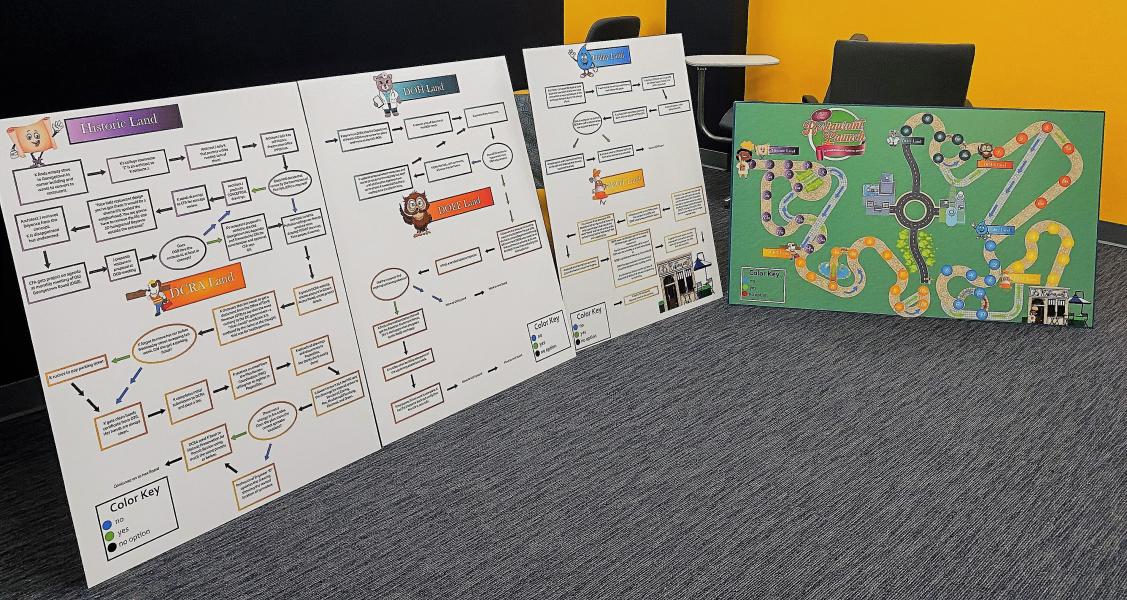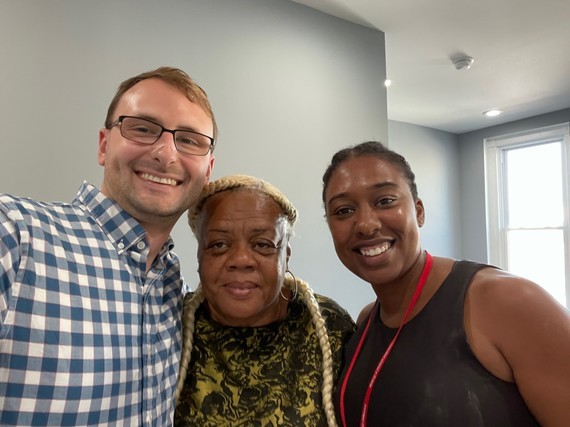Year 1: Permitting – A Better Path for Small Businesses
Overview & Context
At the start of our first year, Mayor Bowser asked the Innovation Team (i-team) to review the District’s building and public space permitting process. We focused on small business owners—a group disproportionately affected by long approval times, complex requirements, and limited resources to speed up or navigate the system. Working closely with multiple agencies, we sought to reduce application hurdles, streamline inter-agency coordination, and improve the overall experience for everyone needing permits in the District.
Understanding the Problem Phase (July–October 2022)
Deep-Dive Research and Discovery

- Defining Our Target
We zeroed in on small business owners after learning they often cannot afford accelerated plan reviews or specialized “permit expediters.” Because delays can severely limit a business’s ability to open or expand, these entrepreneurs needed tailored support. - Stakeholder Interviews and Data Analysis
- Agency Outreach: We held eight interviews with District sister agencies (DOB, DDOT, DOEE, DC Health, Office of Planning, among others) and five interviews with utilities (DC Water, Pepco, etc.).
- External Partners: We spoke with the American Institute of Architects (AIA), the District of Columbia Building Industry Association (DCBIA), and the small business community to capture a wide range of perspectives.
- Quantitative Insights: We examined Open Data DC permit records from FY09–FY22, gleaning patterns about application volume, average review time, and common delays that arise from multi-agency sign-offs.
- Surveying Small Business Owners
We disseminated a comprehensive survey to small-business operators citywide. Their feedback made it clear that multi-layered processes, unpredictable timelines, and opaque requirements caused frustration and, at times, serious financial hardship. - Forming an Advisory Board
Near the end of this phase, we established an Advisory Board of agency representatives and local small business owners (one from each Ward). This group helped us interpret the research findings, confirm pain points, and ensure we stayed focused on solutions that met real community needs.
Key Findings
- Prohibitive Costs: Accelerated review and permit expediters are out of reach for many smaller ventures.
- Unpredictable Timelines: Without clear service-level agreements, businesses struggled to plan.
- Fragmented Process: Multiple agencies each have distinct portals and steps, making it cumbersome to track or coordinate a single permit package.
This discovery phase ended with a refined project objective: reduce the time and complexity of permitting for small business owners, so they can open or expand their operations with clarity and confidence.
Generate Ideas Phase (November 2022–January 2023)
Co-Creation and Prototyping

- Brainstorming Solutions
Together with our Advisory Board, we facilitated workshops and co-design sessions to re-imagine the permitting journey. We used insights from peer city research—like Denver and San Francisco—to identify best practices. - Prototypes and Testing
Our initial planning led to seven major recommendations, each aiming to reduce confusion, streamline inter-agency reviews, or remove financial barriers. Core proposals included:- Permit Explorer: A digital tool that, based on a property address and project details, shows all required permits, estimated costs, and typical timelines.
- Concept Reviews for Small Businesses: One-stop “pre-submission” sessions with every relevant agency to clarify requirements up front.
- Service Level Agreements: Public, enforceable time standards for how quickly agencies conduct reviews.
- Universal Permit Wizard: An online portal combining all permit applications in one place.
- Streamlined Clean Hands: Integrating “Clean Hands” checks more directly into the permit flow.
- Regulatory Simplifications: Recommending targeted updates to the building code or permit regulations.
- Examination of Permit Costs: Expanding grants or subsidies specifically for small business owners who can’t afford advanced review or major permit fees.
- Collaboration with Agencies
We shared these prototypes with the District Department of Buildings (DOB), District Department of Transportation (DDOT), and other agencies involved. Each contributed data or feedback to refine potential solutions.
Outcome of Idea Generation
We prioritized three of these solutions—Permit Explorer, Concept Reviews, and establishing Service Level Agreements—for immediate feasibility planning. The remaining four were poised for more in-depth agency proposals or funding analysis.
Permit Explorer
Universal Permit Wizard
Deliver Solutions Phase (February–March 2023)
Laying the Groundwork for Implementation
- Implementation Plans
We worked with our partner agencies to outline how each of the three prioritized recommendations could be piloted. This involved:- Drafting Scope: Requirements for user interface design, coordination among sister agencies, and needed policy changes.
- Identifying Metrics: Proposed tracking of average issuance times, number of resubmissions, user satisfaction, and cost savings.
- Transition to New Mayoral Priority
Before these pilots could officially launch, the Mayor requested the i-team switch to a new focus area (Year 2: Hiring). However, we compiled detailed final reports with step-by-step guidelines on how District agencies could carry these recommendations forward. - Where We Left Off
- Pilot-Ready Plans: The top three proposals were pilot-ready and included practical roadmaps for technology updates, staff training, and communications strategies.
- Agency Proposal Packets: The other four solutions were packaged as proposals for relevant agencies—like the possibility of a Universal Permit Wizard or expanded small business permit subsidies—to adopt when resources and bandwidth allow.
Our Lasting Impact
Though the i-team did not fully implement these prototypes, we left behind actionable documents and collaborative structures—like the Inter-Agency Advisory Board—that remain valuable resources for any next phase of permit modernization in the District.
Year 1 Results at a Glance
- 3 solutions deemed pilot-ready: Permit Explorer, Concept Reviews, Service Level Agreements.
- 4 additional concepts packaged for agency-led evaluation and future adoption.
- 100+ hours spent on inter-agency interviews, workshops, and small business focus groups.
- 2 major sets of data analyses on application trends and average approval times from FY09–FY22.
- 1 newly formed Advisory Board bridging agency staff and small business owners from every Ward.

“Although our permitting prototypes did not fully launch before we switched projects, the ground we covered—data analysis, user feedback, and inter-agency collaboration—laid a strong foundation for further reforms in the District's building permit process.”
– Innovation Team
If you want deeper detail, our Final Recommendations Memo and Project Plan Appendices summarize the small business permitting research and the solutions we proposed.

